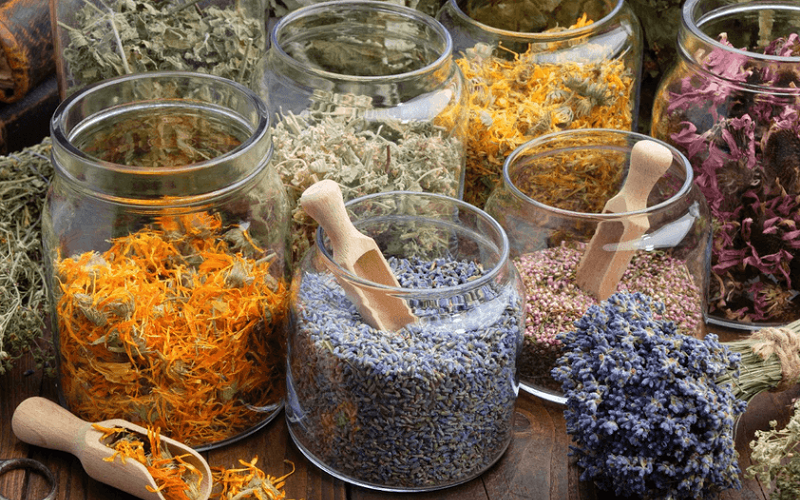
As we journey through life, our cognitive abilities inevitably face the tests of time. Cognitive decline, a natural part of aging, can be a concerning prospect, impacting memory, attention, and problem-solving skills. Yet, amidst this universal challenge, there lies a rich tapestry of traditional wisdom. Here we explore the world of traditional herbal remedies, spanning continents and cultures, each offering unique insights into preserving cognitive health. From the revered Ginkgo Biloba in China to the calming Lemon Balm of Southern Europe, these natural treasures have been trusted by generations for their restorative properties.
Contents
- Introduction to Cognitive Decline and Herbal Remedies
- Herbal Cognitive Decline Remedies from Different Cultures
- Scientific Evidence Supporting Herbal Remedies
- Practical Application and Considerations of Herbal Remedies for Cognitive Decline
- References
Introduction to Cognitive Decline and Herbal Remedies
In today’s fast-paced world, maintaining cognitive health is more crucial than ever. As we age, our mental faculties often show signs of wear, a phenomenon known as cognitive decline. Here we set the stage for an exploration into the realm of traditional herbal remedies, revered across various cultures for their potential to support and enhance cognitive health.
Explanation of Cognitive Decline
Cognitive decline, a term often associated with aging, refers to the gradual loss of cognitive abilities, including memory, attention, and problem-solving skills. While some degree of decline is a normal part of aging, significant losses can impact daily life and overall well-being.
Definition and Key Symptoms
Cognitive decline ranges from mild forgetfulness to more severe forms like dementia. Key symptoms include memory loss, difficulty in learning new things, challenges in concentrating, and making decisions.
Common Causes and Risk Factors
Various factors contribute to cognitive decline. Aging is the primary cause, but lifestyle factors, such as poor diet, lack of exercise, and insufficient mental stimulation, also play significant roles. Additionally, genetic factors and medical conditions like Alzheimer’s disease can accelerate cognitive decline [1].
Overview of Traditional Herbal Remedies for Cognitive Decline
For centuries, people have turned to nature’s pharmacy to address various health concerns, including cognitive decline. Traditional herbal remedies, deeply rooted in the medical practices of ancient civilizations, have been passed down through generations.
Historical Perspective
Across the world, from the dense forests of the Amazon to the high mountains of the Himalayas, ancient healers and practitioners have identified and utilized a plethora of herbs for their medicinal properties. These practices form the cornerstone of many traditional healing systems, such as Ayurveda and Traditional Chinese Medicine.
Relevance in Modern Times
Despite the advances in modern medicine, these traditional remedies continue to hold significance. They offer a more holistic approach to health and well-being, often with fewer side effects than conventional medicine. The growing body of scientific research is beginning to validate many of these age-old treatments, particularly in the context of cognitive health and well-being.

Herbal Cognitive Decline Remedies from Different Cultures
Across the globe, diverse cultures have harnessed the power of nature to combat cognitive decline. This section explores some of these treasured herbal remedies, each with its unique history and set of benefits. From Asia to Africa, these traditional herbs offer a window into the vast and varied approaches to cognitive health.
Asian Remedies for Cognitive Decline
Asia, a continent rich in herbal medicine traditions, offers a plethora of plants known for their cognitive benefits.
Ginkgo Biloba (China)
Revered for centuries in Chinese medicine, Ginkgo Biloba is famous for its ability to enhance memory and cognitive function. This ancient tree’s leaves are used to improve blood circulation and oxygen flow to the brain, which is essential for maintaining cognitive health [2].
Brahmi (India)
In Ayurveda, Brahmi is celebrated for its mind-enhancing properties. This small, creeping herb is believed to boost memory, concentration, and mental clarity. It is often used to alleviate stress and anxiety, which can indirectly benefit cognitive health.
European Remedies for Cognitive Decline
Europe, with its rich history of herbalism, also contributes significantly to natural cognitive health remedies.
Sage (Mediterranean Region)
Known for its aromatic leaves, Sage has a long history of use in both culinary and medicinal contexts. It is credited with improving memory and concentration, and recent studies have shown its potential in treating mild to moderate Alzheimer’s symptoms.
Lemon Balm (Southern Europe)
Lemon Balm, with its mild lemon scent, is not just a culinary delight but also a cognitive booster. It is known for its calming effects, improving mood and mental performance, particularly in reducing anxiety and promoting a sense of calm.
American Remedies for Cognitive Decline
The Americas, both North and South, have their unique contributions to the herbal treatment of cognitive decline.
Green Tea (North America)
Although originally from East Asia, Green Tea has become a staple in North American herbal medicine. Loaded with antioxidants and amino acids, it can enhance brain function, improve mood, and protect against neurodegenerative diseases [3].
Maca Root (South America)
Hailing from the Andes Mountains of South America, Maca Root is traditionally used to improve energy and stamina. Emerging research suggests it also has potential benefits for cognitive function and mental health.
African Remedies for Cognitive Decline
Africa, with its diverse flora, offers unique herbs that are used in traditional medicine to support cognitive health.
Rooibos (South Africa)
Rooibos tea, a staple in South African culture, is rich in antioxidants and known for its potential to reduce stress and protect against cognitive decline.
Gotu Kola (Various Regions)
Widely used in African traditional medicine, Gotu Kola is believed to enhance memory and nerve function. It’s also used to reduce anxiety and stress, which are known to impact cognitive health.

Scientific Evidence Supporting Herbal Remedies
While traditional knowledge has long endorsed the use of herbal remedies for cognitive health, modern science has begun to shed light on their efficacy and mechanisms.
Research on Specific Herbs for Cognitive Decline
The surge in interest in natural remedies has led to a considerable amount of scientific research. Here, we examine some of the key findings related to the herbs discussed earlier.
Clinical Trials and Findings
Ginkgo Biloba
Numerous studies have focused on Ginkgo Biloba’s effectiveness in enhancing cognitive function. Research suggests it may improve memory and processing speed in older adults, though results vary [4].
Brahmi
Clinical trials indicate that Brahmi can improve memory retention and recall. It is also found to have a significant antioxidant effect, which is crucial for brain health.
Sage
Research has shown that Sage can improve cognitive performance and mood. It is particularly noted for its potential in enhancing attention and memory.
Lemon Balm
Studies demonstrate Lemon Balm’s efficacy in improving cognitive performance and alleviating anxiety, contributing to overall mental well-being.
Green Tea
Rich in catechins and L-Theanine, Green Tea is proven to enhance cognitive function, particularly in terms of working memory and attention.
Maca Root
While research is still emerging, early studies suggest that Maca may have a positive impact on mood and cognitive function.
Mechanisms of Action
The cognitive benefits of these herbs often stem from their antioxidant properties, which help combat oxidative stress, a major factor in cognitive decline. Many also influence neurotransmitter activity, vital for memory, mood, and cognitive functions.
Comparison of Herbal Treatments with Conventional Treatments for Cognitive Decline
Herbal remedies offer an alternative or complementary approach to conventional cognitive health treatments. It’s essential to understand how they compare in terms of efficacy and safety.
Efficacy and Safety
Herbs like Ginkgo Biloba and Brahmi have been shown to be effective in certain contexts, though they might not be as potent as some pharmaceuticals. However, their appeal often lies in fewer side effects and a broader range of health benefits. Safety profiles of these herbs are generally favorable, but they should be used with caution, especially when combined with other medications [5].
Integrating with Modern Healthcare
As interest in holistic and integrative medicine grows, these herbs are increasingly being incorporated into modern treatment regimens.
Collaboration between traditional and modern medicine can offer a more comprehensive approach to cognitive health, combining the strengths of both worlds.
Practical Application and Considerations of Herbal Remedies for Cognitive Decline
Knowing about the potential benefits of herbal remedies is just the first step. Applying this knowledge practically and safely is crucial for anyone looking to incorporate these natural solutions into their daily routine for cognitive health.
Incorporating Herbal Remedies into Daily Life
Integrating herbal remedies into one’s daily regime can be a rewarding approach to maintaining and enhancing cognitive health.
Dosage and Preparation Methods
It’s essential to follow recommended dosages for each herb. Overuse can lead to adverse effects.
Preparation methods vary from teas and tinctures to capsules and extracts. Choosing the right form depends on personal preference and the specific herb in question.
Lifestyle and Dietary Synergy
Herbal remedies work best when accompanied by a healthy lifestyle, including a balanced diet, regular exercise, and adequate sleep. Some herbs may interact with certain foods or have specific dietary requirements to enhance their efficacy. For instance, fat-soluble herbs should be taken with meals containing healthy fats.
Precautions and Contraindications for Herbal Remedies for Cognitive Decline
While herbal remedies are generally safe, they are not without their risks and limitations.
Potential Interactions with Medications
Certain herbs can interact with prescription drugs, either enhancing or inhibiting their effects. For example, Ginkgo Biloba can interfere with blood thinners. Always consult with a healthcare professional before combining herbal remedies with medication.
Understanding Limitations and Risks
Herbal remedies should not be seen as a cure-all. They are best used as part of a broader approach to health.
Be aware of the signs of adverse reactions, such as allergic responses, and seek medical advice if they occur.
References
[1] Herbal Medicine for Patients with Cognitive Impairment
[2] A Study of Herbal Remedies for Memory Complaints
[3] Herbal extract shows promise as a treatment for mild cognitive impairment
[4] Natural Supplements and Vitamins for Treatment and Prevention of Dementia and Cognitive Decline
[5] 5 Herbs to Boost Your Memory

